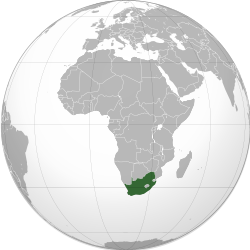| Gayle | |
|---|---|
| Gail | |
| Region | South Africa: mainly in Johannesburg, Pretoria, Cape Town, Durban, Bloemfontein, and Port Elizabeth |
Native speakers | None [1] L2 speakers: 20,000 |
| Language codes | |
| ISO 639-3 | gic |
| Glottolog | gail1235 |

Gayle, or Gail, is an English- and Afrikaans-based gay argot or slang used primarily by English and Afrikaans-speaking homosexual men in urban communities of South Africa, and is similar in some respects to Polari in the United Kingdom, from which some lexical items have been borrowed. The equivalent language used by gay South African men who speak Bantu languages is called IsiNgqumo , and is based on a Nguni lexicon. [3] [4] [5]
Contents
Gayle originally manifested as moffietaal (Afrikaans: literally, "homosexual language") in the drag culture of the Cape Coloured community in the 1950s. It permeated into white homosexual circles in the 1960s and became part of mainstream white gay culture. [3] [4] [5]
Besides a few core words borrowed from Polari (such as the word varda meaning "to see", itself a borrowing from Lingua Franca), most of Gayle's words are alliterative formations using women's names, such as Beulah for "beauty", Priscilla , meaning "police", and Hilda for "hideous". Men, especially other homosexual men, are often referred to by female pronouns in some circles, as is the custom among many homosexual countercultures throughout the world. [3] [4] [5]
Gayle arose for the same reason that most antilanguages develop, to ensure in-group preference in diverse societies. However it also fulfilled other functions such as to "camp up" conversation, and provide entertainment in a subculture where verbal wit and repartee are highly valued. [3] [4] [5]
A comprehensive study of Gayle was undertaken by linguist Ken Cage in 2002, and his Master’s Thesis was published as “Gayle, the language of Kinks and Queens” (2003: Jacana Media). This book, although out of print now, was the first attempt to publish a history of Gayle, as well as a basic dictionary of the argot.
More recently, Gayle has experienced a resurgence and increased popularity following the Showmax series Beaulah: Queens Van die Kaap - a 2024 reality TV show that documents the lives and talents of prominent and upcoming drag queens from the Cape Town drag scene. Gayle has also seen some vitality on Tik Tok.
